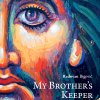[NEW YORK POST] Parishioners watched in horror as a massive 4-alarm fire engulfed a Serbian Orthodox church in Manhattan on Sunday — hours after hundreds celebrated Easter services, authorities said.
“For this to happen on such a holy day, I don’t know what to say,” said Alex Velic, a 31-year-old churchgoer, as enormous fireballs erupted from the shattered windows of the Serbian Orthodox Cathedral of St. Sava on West 25th Street.
“To see it burning like that is such a shock. It’s just so sad,” he said. “I can’t think of the words to express how I’m feeling.”
A force of 170 firefighters responded to the fire, which started shortly before 7 p.m., FDNY officials said. Church officials and the FDNY both said there were no reports of major injuries, though three firefighters and a church caretaker had minor smoke inhalation.
“Nobody is hurt, everyone is safe,” explained Father Djokan Majstorovic, Dean of the Cathedral.
Fire Commissioner Daniel Nigro said there had been 700 people inside the church earlier in the day for the Orthodox Easter service. He added that the cause of fire at the historic house of worship is still under investigation.
“It’s a very sad day today,” Nigro said. “They had their mass at 10am and then a luncheon. The good news is that there was no one inside when the fire started and there are no injuries. One man is being checked out for smoke inhalation.”
Photos on Twitter showed flames shooting out the windows of the church as clouds of smoke billowed out the side. Parishioners could be seen packed in the pews hours earlier.
Извор: Serborth
Саборна црква Светог Саве у Њујорку изгорела је у пожару који ју је захватио само неколико сати након што су верници у њој присуствовали ускршњој литургији.
Према досадашњим информацијама, нема повређених, а пожар је стављен под контролу. И после великог напора 170 ватрогасаца, црква је добрим делом уништена.
Црква је, како је саопштила њујоршка ватрогасна служба, била празна када је избио пожар који се брзо проширио и захватио цело здање на западној 25. улици у дистрикту Флатирон.
Старешина цркве Ђокан Мајсторовић, рекао је за РТС да је пожар избио око 17 часова по локалном времену, односно око 23 сата по овдашњем времену.
"То је најжалоснија вест која се могла догодити, посебно на данашњи свети велики празник. Из комшилука су прво приметили да се у цркви нешто догађа, позвали су ватрогасну службу. Још увек се ватрогасна кола налазе око цркве и гашење још траје. Сви ми који живимо у близини цркве смо евакуисани и не можемо да приђемо ближе од 200 - 300 метара. Црква је потпуно изгорела, кров је потпуно уништен, остали су само зидови. Владика је био овде и он ће обавестити Патријаршију", рекао је отац Мајсторовић.
Ватрогасна служба објавила је да се срушио део крова и да је структура зграде нестабилна.
Истрага о пожару је у току, а полиција искључује могућност терористичког акта.
Црква, позната и као Капела Свете Тројице саграђена је пред крај 19. века по нацрту архитекте Ричарда Упџона и грађена је у готском стилу.
Некада је припадала протестанској цркви, али ју је владика Николај Велимировић, уз помоћ верника, откупио за потребе српске заједнице. Храму су временом додавани византијски елементи, поставши архитектонски драгуљ Њујорка.
Од првих дана 1944. године, када је освештана, црква у Њујорку постала је српски православни мисионарски центар. У њој се организују и културне, образовне и друштвене активности.
Од 1968. године црква Светог Саве налази се на листи њујоршких знаменитости.
Извор: РТС




